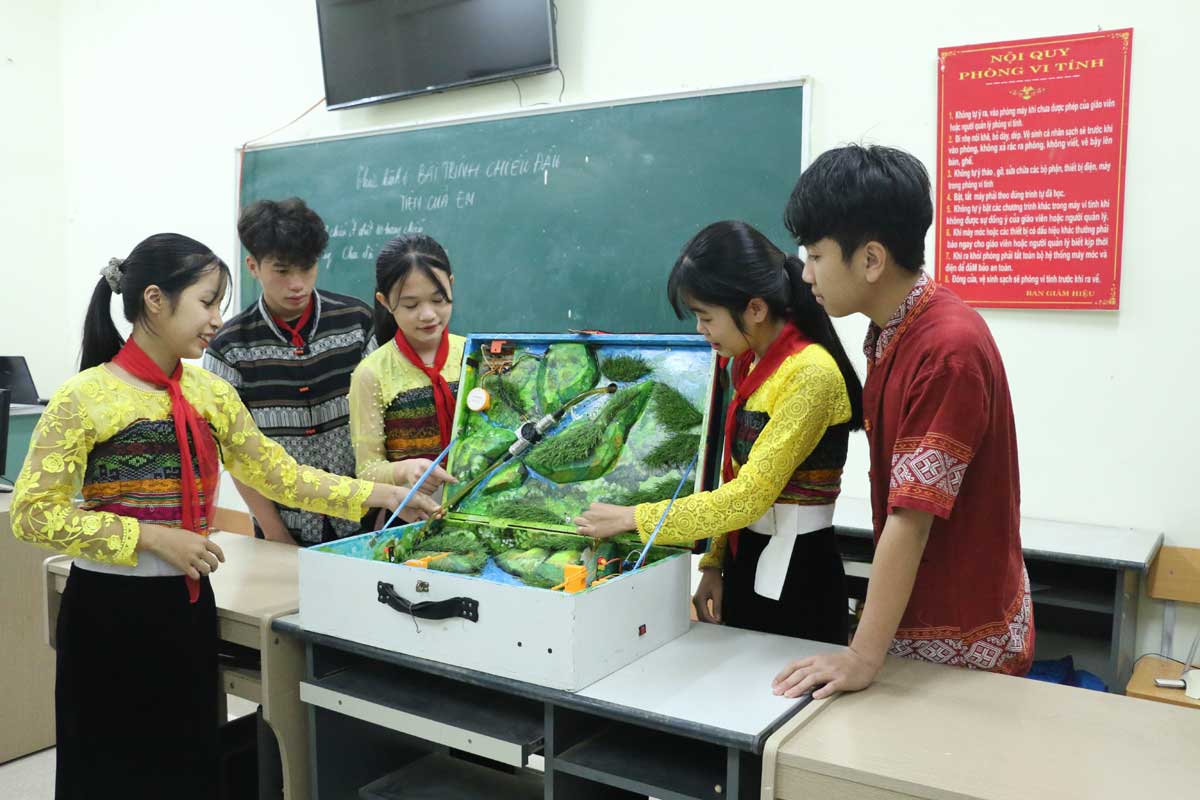
(HBO) – A project on flood and landslide warning developed by a group of Thai ethnic minority students from Hoa Binh won the second prize at an exchange event of programming clubs nationwide hosted by the Dariu Foundation in the Central Highlands province of Lam Dong. The pupils are from the Na Phon primary and secondary school in Mai Chau district’s Na Phon commune.
 A project on flood and landslide
warning by a group of Hoa Binh students from the Na Phon primary and secondary
school wins the second prize at an exchange event of programming clubs
nationwide hosted by the Dariu Foundation.
A project on flood and landslide
warning by a group of Hoa Binh students from the Na Phon primary and secondary
school wins the second prize at an exchange event of programming clubs
nationwide hosted by the Dariu Foundation.
According
to ninth grader Ha Thi Thu Huong, a member of the group, the transport system
in mountainous Na Phon commune include special bridges crossing streams, which
are often hit by unexpected floods during the rainy season.
Unexpected
floods and landslides have caused accidents and damage to both people and their
vehicles, she said.
"From
the fact and with support from our teachers, we came up with the idea and worked
to translate it into reality in hope of reducing damage caused by natural
disasters in mountainous areas,” Huong noted.
When
it is raining hard, a flood is quick to form on a stream. It is also very
difficult to predict when the flood hits the bridge crossing it. Therefore, the
pupils built a flood warning model, which places a flow sensor about 2km away
from these risky bridges.
Ha
Manh Hung, another member of the group, said the sensor will send signals to a
microprocessor that turns on lights of different colours – green for normal
passing, yellow for restricted passing, and red for stop. When the red light is
turned on, a bar will be pulled down. The system uses solar energy and rechargeable
batteries.
Based
on the same principles, the group studied to put sensors at areas with a high
risk of landslides. When the danger is near, the system will send signals via
lights or loudspeakers to alert nearby residents.
During
their implementation of the project, the pupils faced myriad difficulties. They
are all from an ethnic minority and disadvantaged backgrounds. Owning no
computers at home, they had to carry out all of their researches at school.
They also encountered challenges purchasing needed equipment.
Their
success despite difficulties will contribute to encouraging local students,
particularly ethnic minorities, to engage in scientific and technological
research and innovation./.
Hoa Binh province is undergoing a dynamic transformation amid Vietnam’s national digital transition. Building on Poliburo’s Resolution No. 57-NQ/TW on breakthroughs in science, technology, innovation, and national digital transformation, the province has rolled out a wide range of practical action plans. A standout initiative is the "Digital Literacy for All” movement, an effort to ensure that no one is left behind in the digital era.
Hoa Binh province is undergoing a dynamic transformation in the wake of the national digital transformation movement. Building on Resolution No. 57-NQ/TW of the Politburo on breakthroughs in science, technology, innovation, and national digital transformation, the province has implemented a wide range of practical action plans. A standout initiative is the "Digital Literacy for All” movement ambitious effort to ensure that no one is left behind in the digital age.
With a spirit of unity and proactive problem-solving, the Party Committee, the government and the people of Dong Lai Commune (Tan Lac District) have made great strides in implementing the resolutions of the 24th Party Congress of the commune for the 2020 - 2025 term. Focusing on leadership and practical actions, the commune has brought the Party’s resolutions into daily life, creating strong impacts and pushing the local development forward.
Amid the nationwide push for digital transformation, young people in Hoa Binh Province are stepping up as dynamic pioneers, applying technology to enhance Youth Union operations and expand the reach of youth-led initiatives. Through creativity and adaptability, Youth Union organizations at all levels have introduced a series of practical solutions, contributing to modern governance and community development.
In recent years, An Nghia commune, located in Lac Son district, has stepped up administrative reform, focusing on improving the quality and efficiency of its single-window service unit for receiving and processing administrative procedures. These improvements have helped create favourable conditions for local residents and organisations to handle administrative procedures, contributing to the commune’s broader socio-economic development.
The Prime Minister-approved master plan to develop the multi-use value of forests ecosystems through 2030, with a vision to 2050, aims to improve the management and sustainable use of forest resources, create jobs, increase incomes, and improve the living standards of ethnic minorities, people in mountainous and remote areas, forest workers and those living near forests.



 A project on flood and landslide
warning by a group of Hoa Binh students from the Na Phon primary and secondary
school wins the second prize at an exchange event of programming clubs
nationwide hosted by the Dariu Foundation.
A project on flood and landslide
warning by a group of Hoa Binh students from the Na Phon primary and secondary
school wins the second prize at an exchange event of programming clubs
nationwide hosted by the Dariu Foundation.